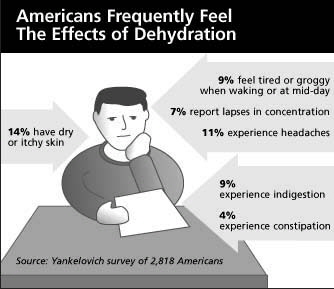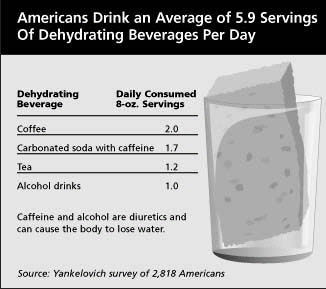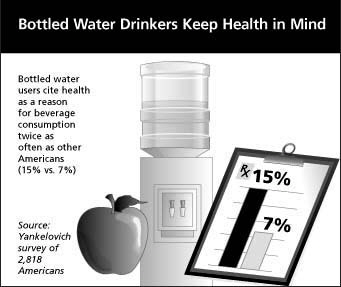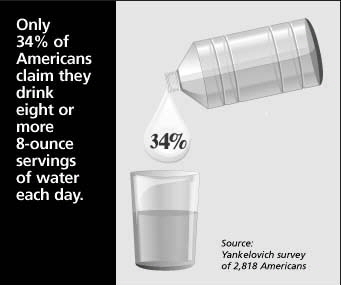|
|
 |
 |
|
We included the most frequently asked questions. We hope they help!
|
 |
 |
|
What is bottled water?
Water is called "bottled water" if it meets all federal and state standards, is sealed in a sanitary container and sold for human consumption. Some bottled water includes carbonation, which can occur naturally in the water or be added by the bottler. Flavors, extracts and essences -- derived from spice or fruit -- can be added to bottled water, but these additions must comprise less than one percent by weight of the final product. Beverages containing more than the one-percent-by-weight flavor limit are soft drinks, not bottled water. Bottled water cannot contain sweeteners or additives (other than flavors, extracts or essences) and must be calorie-free and sugar-free. In addition, most bottled waters are sodium-free or include "very low" amounts of sodium.
Top
|
 |
 |
|
What are the different types of bottled water?
There are several varieties of bottled water, including: artesian water, mineral water, sparkling water, spring water, well water and purified water. A specific definition for each term has been proposed as part of new, additional regulations being considered by the U.S. Food and Drug Administration (FDA).
Artesian Water: Bottled water from a well that taps a confined aquifer ( a water-bearing underground layer of rock or sand) which stands above the normal water table.
Mineral Water: Bottled water originating from geologically and physically protected underground water source. Mineral water must contain mineral and/or trace elements that make it clearly distinguishable from other types of water. This content must remain constant in the water's original state at the point of emergence from the source.
Sparkling Water: Bottled water containing carbon dioxide, which occurs naturally or is added following emergence from the source. (An important note: soda water, seltzer water and tonic water are not considered bottled waters. They are regulated separately, may contain sugar and calories, and are considered soft drinks.)
Spring Water: Bottled water that flows naturally from an underground source to the surface of the earth. Spring water must be collected directly from the spring or from a bore hole that is adjacent to the water's natural point of emergence. Spring water collected by pump, or any other device applying external force, must retain all the properties of, and be of the same composition and quality as, the water flowing naturally to the surface.
Well Water: Bottled water collected from an aquifer through a hole bored, drilled or otherwise constructed in the ground.
Purified Water: Bottled water produced by distillation, deionization, reverse osmosis or another suitable process that meets the definition of purified water in the United States Pharmacopoeia. Water that meets this definition, and is vaporized then condensed, may be labeled "distilled water."
Top
|
 |
 |
|
How much water should I drink everyday?
That depends on your body weight and daily activity level. A general rule of thumb is to drink at least eight glasses of water a day (1 glass=8 ounces, 8 glasses=64 ounces). But the more active you are, the more water your body needs.
Top
|
|
|
I do not seem as thirsty when I am cold. Do I need to drink as much water?
Absolutely. You still lose water through perspiration and exhaled air. When cold, dry air is inhaled, it is warmed and moistened in the lungs and exhaled as humid warm air. This process makes intense demands on the body's water supply.
Top
|
|
|
 |
 |
|
Can I tell how much water my body needs by how much I sweat?
No. Sweat is not an accurate indicator of dehydration. The amount a person sweats can depend on a variety of factors such as environment, clothing, temperature and activity level. You can't judge your hydration level by the amount of sweat on your skin or t-shirt, or by how thirsty you feel. To be safe, make sure you follow the guidelines contained in the chart under "How much water should I drink every day?"
Top
Can I drink soft drinks to rehydrate?
No. The caffeine found in many soft drinks acts as a diuretic and depletes your body of fluids rather than replenishing them. By drinking these beverages, you could be making matters worse
 
Top
|
 |
 |
|
The tap water in my area is proclaimed to be "safe to drink". So what are the advantages of bottled water?
Tap water quality is inconsistent at best, and suffers from several disadvantages. First, municipal tap water is usually treated with chlorine, which makes the water taste bitter. Second, tap water flows through pipes, which in older buildings, may contain lead. Its quality is not guaranteed by the time it reaches you. Furthermore, the supplies are often threatened by industrialization, agriculture, and natural disasters.
Bottled water, on the other hand, offers a more consistent, superior taste compared to tap water. It contains no lead or other harmful chemicals, and no chlorine is used during the purification process. The sealed bottle also protects the water, so what you get in the bottle is the same water as the source. And let's not forget the convenience of having both hot and cold water offered by our service.
Top
I've been boiling tap water so far without any problems. Are there any reasons why I should switch to bottled water?
While boiling tap water kills some harmful bacteria, it does not remove any of the chemicals or minerals that may make the water taste objectionable, or may be hazardous to your health. Boiling tap water is also inconvenient and wastes energy and time.
Top
What about pitcher filters?
Pitcher filters will remove chlorine and other objectionable/harmful chemicals from tap water, but they often leave black particles in the water. While not harmful, some people consider them to be objectionable. Also, the filters must be replaced every two months to retain optimal performance.
Top
How long can I store bottled water?
The Food and Drug Administration has not established a shelf life for bottled water. Bottled water can be used indefinitely if stored properly.
Top
|
 |
 |
|
What is the proper way to store bottled water?
Bottled water should be stored in a cool (i.e. room temperature), dry environment away from chemicals such as household cleaning products and away from solvents such as gasoline, paint thinners and other toxic materials.
Top
Does bottled water contain chlorine?
No. Bottlers do not use chlorine as a final disinfecting agent in bottled water. Bottlers use ozone (O3), a form of oxygen, or ultraviolet light. Unlike chlorine, which is commonly used in public water supplies, these methods disinfect water without leaving any after taste or smell.
Top
Why should people pay to drink bottled water when they can drink tap water for free?
The number one reason consumers choose bottled water is taste. Unlike tap water which uses chlorine as a final disinfectant, bottled water is most commonly disinfected with ozone, which does not leave a residual taste.
Second, consumers are concerned about the quality of their tap water. In addition to concerns, about chlorine by-products, contaminants such as lead, nitrates and micro-organisms have been discovered in municipal water supplies. Consumers are turning to bottled water because they can be assured of bottled water's high quality.
The third reason consumers choose bottled water is for what it does not contain -- calories, caffeine or alcohol. Consumers are leading a more healthful lifestyle and turning more frequently to bottled water.
Top
|
|




